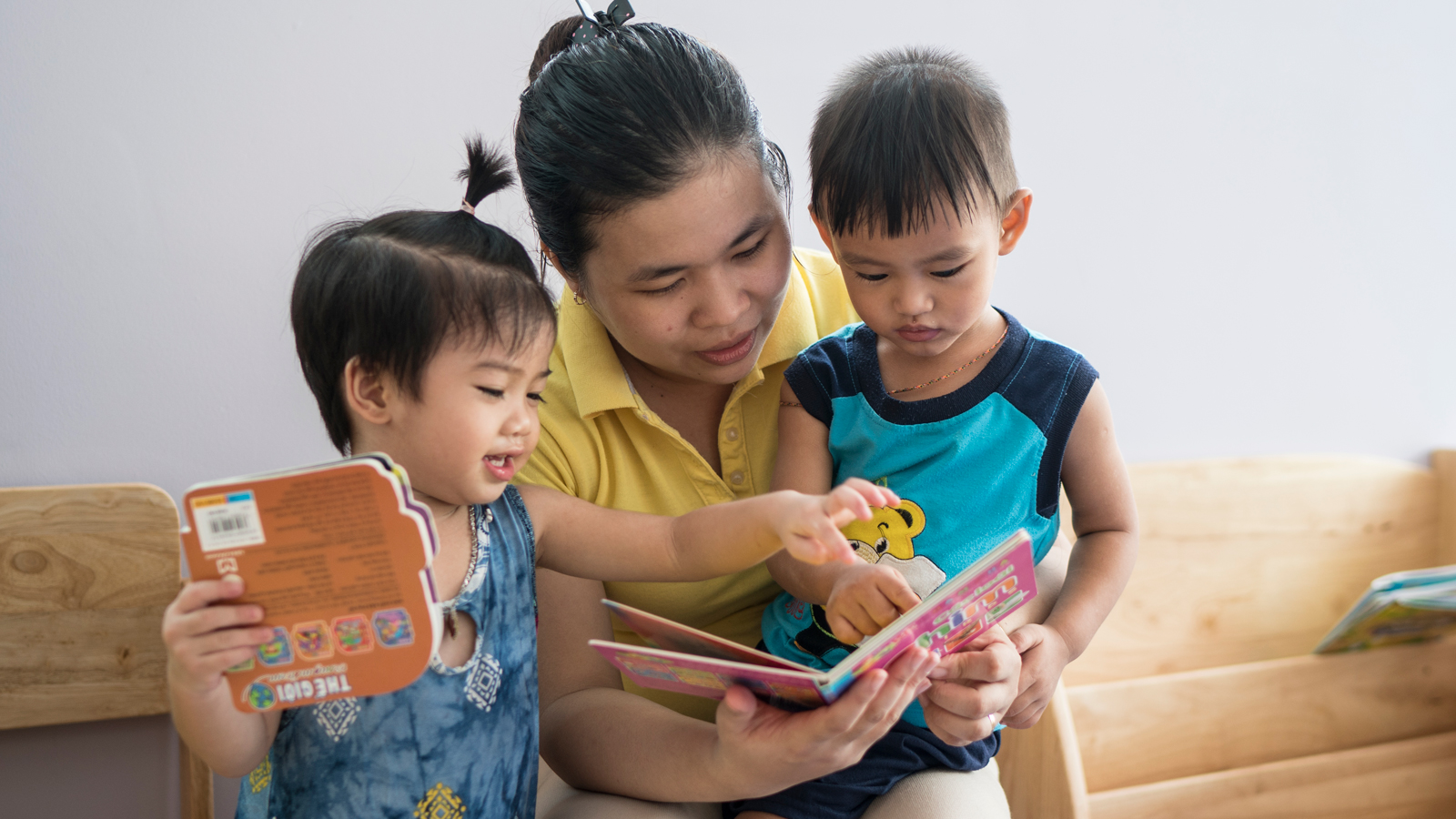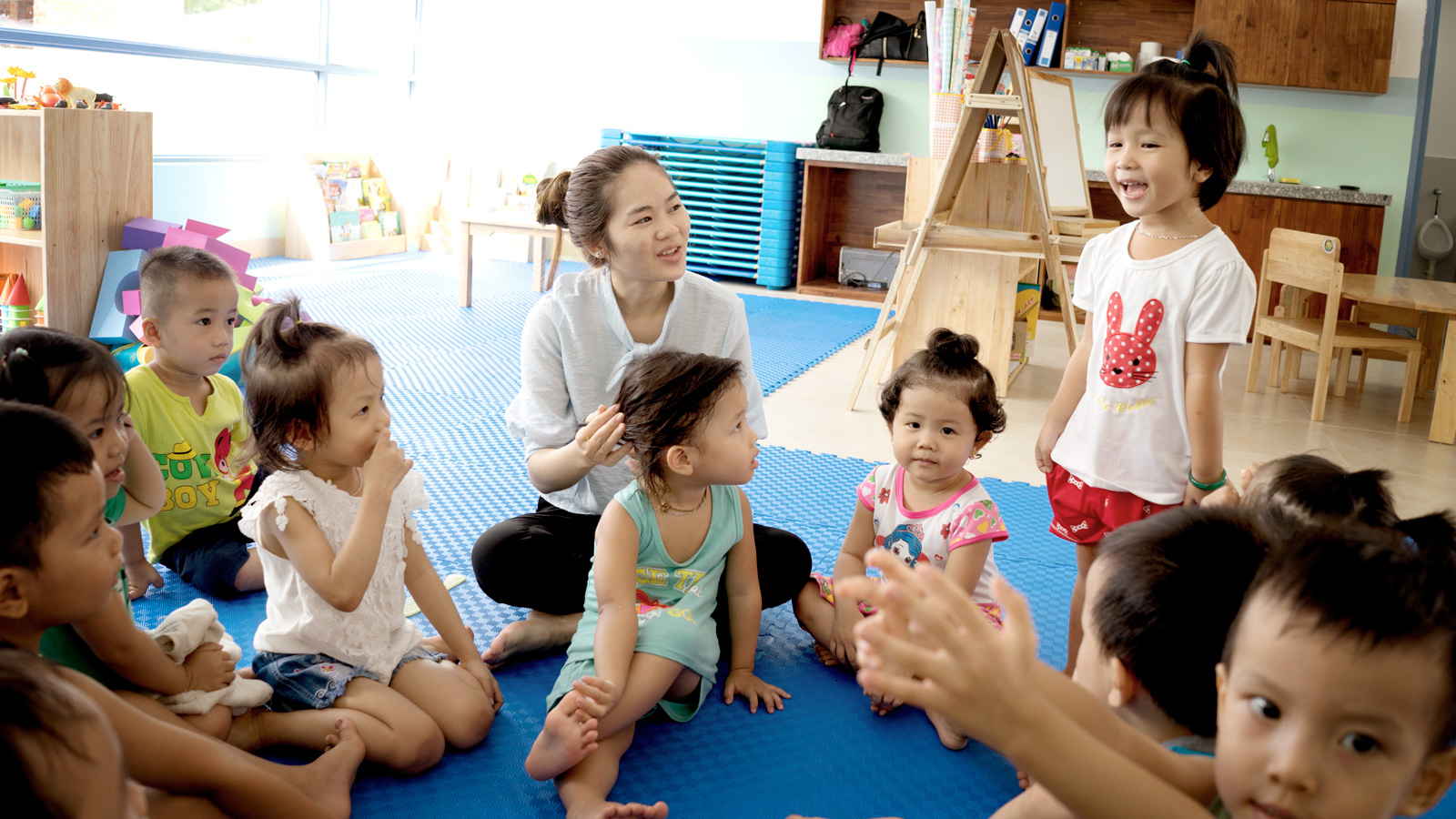Pioneering Nurturing Care and Early Education in Vietnam

Fostering a deep and early love of reading is a primary goal shared by both caregivers and teachers working at the Early Learning Center in Vietnam.
Photo Credit: OneSky
Executive Summary
The OneSky Early Learning Center (ELC) in Da Nang, Vietnam is the first of its kind -- a demonstration center for best practices in early childhood care and education (ECCE) for children of factory workers. Built in collaboration with Vietnam’s Department of Education and Training, the ELC serves as a hub for a multi-pronged model designed to provide early childhood care and education as well as home-based daycare provider training, parenting classes, and online learning opportunities to help reach more than 10,000 children under the age of seven whose parents labor in the Hoa Khanh Industrial Zone's factories. In this article we examine key factors that have contributed to the successful launch of OneSky for all children's Factory Model.
Introduction
Economic development in Vietnam is progressing at lightning speed. Over the past few years, thousands of families have migrated from rural areas to work in the factories fueling Vietnam’s new prosperity. Although Vietnam has passed progressive maternity leave policies and is a signatory to the UN Convention on the Rights of the Child, the 1.2 million children of factory workers whose parents work in the country’s 325 industrial zones are still at risk. Whether due to lack of quality daycare, schools, funding, or residency status, the reality is that many young children are falling through the cracks. Yet, Vietnam is committed to improving the lives of all of its children and, in partnership with OneSky, is piloting a way forward to promote the healthy development of children during the crucial early years when their brains are developing at warp speed.
In Vietnam, there is no public childcare for children under the age of three. For children ages three to six, public preschool is usually out of reach due to prohibitive costs, overcrowding, or migrant ineligibility status. With both parents often working long hours, a cottage daycare industry has emerged. Young children are frequently left in substandard care while their parents labor long hours in factories. As many as 50 children may be looked after by just one or two adults for 12 or more hours a day in home daycare facilities. Home daycare providers receive no formal training and there is little, if any, government oversight to help safeguard the children in their care. More than 4,000 cases of abuse, and sometimes death, are reported each year in daycare centers in or near Vietnam’s industrial zones.
In April 2016, the Vietnamese government and OneSky signed a landmark agreement establishing our first Early Learning and Training Center (ELC) in the Hoa Khanh Industrial Zone in Da Nang. In collaboration with the Department of Education and Training (DOET), the ELC was designed as a hub for the OneSky Factory Model that seeks to address the challenges of early childhood development in newly industrialized areas. In partnership with the government, our goal was to establish ECCE intervention and training programs designed to be replicable across the country.
The OneSky demonstration ELC, which opened in September 2017, has the capacity to serve up to 250 children, six months to 6 years old, with a staff of 55, including teachers, trainers, caregivers, and administrators. Programs based at the ELC include:
- Early Learning: OneSky trains local teachers to provide continuous care and education for children from birth to six years old. These trained teachers enhance healthy early development by blending age-appropriate, responsive care with best practices for early education, using a curriculum adapted to serve the specific needs of children in Vietnam. With this evidence-based methodology, they provide a stimulating and nurturing early learning environment that promotes healthy cognitive, emotional, and social development.
- Home-based Child Care Provider Training: OneSky provides workshops and training for home-based daycare providers so they can deliver quality care and adopt, implement, and replicate best practices. A specialized curriculum tailored for home-based daycare providers is delivered at the ELC training facility and mentoring and hands-on support is provided by OneSky trainers through on-site visits.
- Parenting Classes: OneSky parent trainers provide parenting skills and classes for working parents and caregivers at the OneSky ELC. The class schedules are designed to accommodate parents who work long hours in factories.
- Training of Trainers (TOT): Because OneSky is strongly committed to capacity building, we train local Vietnamese trainers to train others on how to apply best practices for the care and education of young children, which greatly increases our potential long-term impact.
- Online Training: OneSky’s proven training methods will have even greater reach via an on-line platform, 1GiaDinhLong ("1Big Family"), that will be launched within the next few months. The platform will offer discussion forums on early care and education topics, as well as information that can improve the quality of care. This platform will serve as a social network community to encourage connection and learning among caregivers across the district.

Young preschool age children happily gather around their teacher,
bonding over fun shared group activities.
Photo Credit: OneSky
Key Success Factors
Building sustainable partnerships, developing local leadership and capacity, adapting our model for the specific needs of the local community, and designing programs to be scalable are the crucial components of OneSky’s successful launch of our Factory Model in Vietnam.
Partnering with both central and local government is vital to creating systemic change in a childcare system that impacts the lives of millions of vulnerable children and their families. At the time of the landmark agreement between OneSky and Vietnam's Department of Education and Training, the government had already committed to scaling the model to industrial zones throughout the country after an initial pilot phase of the program was successfully completed.
Another factor crucial to the program’s success is the development of local leaders committed to continuing the model after the pilot program concludes. OneSky pays particular attention to building capacity through the training and mentoring of caregivers, teachers, and communities by adapting our training and curriculum to the local language, educational, and cultural mores.
OneSky believes our approach has the potential for widespread and profoundly positive impact on the lives of millions of children at risk. We have seen through our 20 years of work in China that timely, early investment in the wellbeing of very young children can greatly mitigate poor outcomes associated with a large-scale sociological transition such as industrialization. To that end, we are embarking on a new effort to bring our successful models to other countries.
About OneSky
OneSky teaches communities and caregivers to provide nurturing responsive care and early education that unlocks the vast potential hidden in our world's most vulnerable young children. Founded in 1998 to provide care for institutionalized children in China, OneSky is now working toward large-scale, practical application of its innovative, proven early childhood intervention models in multiple developing countries. OneSky's early intervention models address the needs of at-risk children in a variety of circumstances, including China's "economic orphans" whose parents leave their impoverished villages to find jobs in faraway cities and Vietnam's children of factory workers whose parents cannot find quality daycare during their long hours at work. To date, OneSky has trained thousands of caregivers to provide life-changing care that has directly impacted the lives of nearly 170,000 at-risk children and indirectly, millions.


